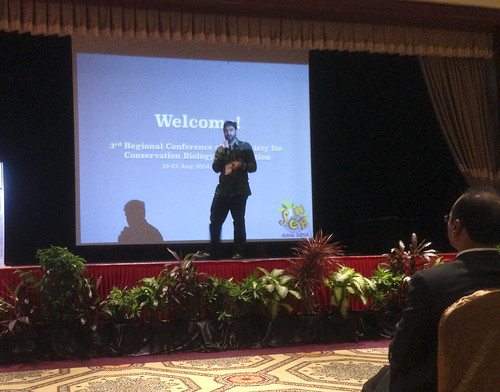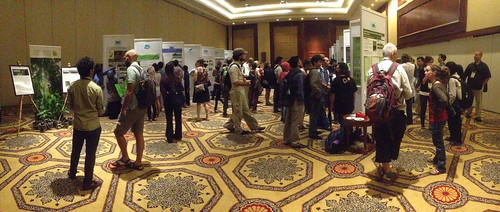20 Feb 2019 update – friends of Bee Lian have fund-raising until 15 Mar to mount a bursary for needy students in her name: “Dr Ong Bee Lian – Department of Biological Sciences (DBS) Bursary Award” [link]
 When we shared the passing of Dr Ong Bee Lian, I was very touched by the comments many former students made in response to the news. They spoke of her lecturing, nurturing mentorship and kindness. I made a general call and thanks to former students from over two decades (1991 – 2011), this aspect of her life is shared and remembered.
When we shared the passing of Dr Ong Bee Lian, I was very touched by the comments many former students made in response to the news. They spoke of her lecturing, nurturing mentorship and kindness. I made a general call and thanks to former students from over two decades (1991 – 2011), this aspect of her life is shared and remembered.
Over the years, I had witnessed her dedication to module matching and placement of students on the exchange programme. More recently, I was able to appreciate very much her strong support for fairness, respect and trust for students when we worked on an ethics committee. I am glad we remember this aspect of her life, for us to appreciate and emulate.
Her family, the many department staff she was close to, and her former students are greatly saddened by her passing and will be glad to hear these thoughts. Those who wish to contribute can still do so here: tinyurl.com/obl-memories.
Thank you Bee Lian, for the kindness you expressed to those around you.
With respect and gratitude,
N. Sivasothi
Department of Biological Sciences,
National University of Singapore
Justin Lee, student (BSc Hons Botany 1991):
“As one of the few woman lecturers around, I will always remember her — not least for the colourful floral dresses — she literally added some colour to the Botany department. Thank you for all that you taught us. You fought hard.
R.I.P. now, Bee Lian.”
Amy Choong, student (BSc Hons Botany 1991) and colleague (2013 – 2015):
“I still remembered what she wore when she came for some of the lectures when I was an undergrad. She used to wear a cheongsum.
I remembered sitting with her on the chartered bus after one department retreat and we had a conversation about our parents and about life.
The last time I spoke to her was during one of the department lunch. I think it was a farewell for Prof Benito.
She was one of the few colleagues whom I can converse in Cantonese with. It is special.”
Maureen Chan, student (BSc Hons Botany 1991):
“Student Dr Ong was fondly called Dr Blong (B.L.Ong) and she was elegant, earnest in what she set out to do and warm. She must have inspired many a female student as she did me.
I was touched when she remembered my name when I returned to the department for the 80th Anniversary of Science Fac and I had brought my kids for the experiments in the lab. I consulted her about doing my post grad and she very kindly advised me the costs it would incur now as a mature student – she was still the warm approachable and kind Dr BLong whom I thought looked the same as I had remembered her way back when.
God bless you Dr Ong and thank you for your guidance and inspiration.”
Chang Chia Yi, student (BSc Honours Zoology, 1995):
“Honestly, I can’t remember what she taught but because of her, I learnt what a strong and intelligent woman looks like. She exudes confidence that tells you that she knows what she is talking about, and yet compassion and connection so that I can easily approach and learn from her, not just about botany but also about life in general.
Thank you so much, Dr Ong for being a testament of a life lived that is connected and meaningful and full of laughter! May you rest in peace and my condolences to Dr. Ong’s family and friends in this time of bereavement.”
Adrian Loo, student (BSc Hons Botany 1997) and colleague (2002-2004):
“As a botany undergraduate, I always found Dr Ong to be approachable and very well versed in her teaching topic, Plant Physiology. She would come in with blank OHP sheets, then the mode of instruction, and then start to develop ideas that were in her head onto the OHP sheets. This development of concepts from scratch made us appreciate the topic very much. She also made a point to print out for us papers in Plant Physiology for us to read.
As an Honours student and later a Postgraduate and postdoc, she was perhaps one of the most supportive of the local students who went into academia. A most happy memory of her was when I had tea with her and Prof Loh Chiang Shiong in the department and I can remember we had a jovial chat and she would speak of her nieces. RIP Bee Lian, thanks for being a wonderful teacher and plant physiologist. We will miss you.”
Lim Cheng Puay, student (BSc Hons, 2000):
“I knew Dr Ong since I became a student in the Botany Department. First impression of Dr Ong as she entered the lecture theatre was that she is a very stern lecturer. It’s not easy explaining the intricacies of plant metabolism to a group of restless undergraduates but she did it with her calm collected composure.
Dr Ong took me in as her research student readily when I asked her if she mind being my mentor. This was when I saw the nurturing side of her. She made sure that I had enough background information about the project, it was on the photosynthetic fluorescence of Pyrrosia pilloselloides. It was 3 sets of 24 hours measurement.
Dr Ong was very patient with this bumbling student of hers, trusting me with a brand new Hansatech machine and teaching me how to interpret the stacks of graphs generated. These skills still serve me very well as a teacher as I now mentor students on research projects.
Years later, I met Dr Ong in a shopping mall. She spotted me instantly and waved at me. It was like meeting an old friend. Dr Ong immediately passed me her email and number when she learnt that I am a biology teacher and invited me to send students over to her lab. I was very touched by her generosity and through this very spontaneous gesture, I realised how deeply passionate she is in education and in nurturing future scientists.
Thank you Dr Ong, you have shaped a very important part of my undergraduate life. Thank you.”
Eileen Oh, honours student (BSc Hons Life Sciences, 2002):
“Dr Ong was my supervisor for my honours thesis on the acridity of plants. She was patient and kind, and spent long hours with us on our experiments, guiding us in our findings and thesis. I have learnt much from her and I enjoyed our academic discussions as well as our personal chit-chat. I will always remember her smile and willingness to share. Rest in peace, Dr Ong. Thank you for the wonderful memories.”
Reuben Clements, student (BSc Life Sciences, 2004; MSc Life Sciences, 2007) and scientific collaborator:
“If I were to sum up Dr. Ong in one word – I would use the word ‘strong’. She was my first lecturer in NUS and she was in charge of the bridging module of my Biology degree. I never took biology for A-levels and that was why I had to take this bridging module. I spoke to her about my fear of not being able to make it past the module, which would then prevent me from progressing further in the degree. But she was very encouraging. Throughout my time at NUS, I found her to be a very caring person who always had time for her students and colleagues. She didn’t seem to smile a lot when she was hurriedly walking around the corridors, but when you spoke to her to long enough, she would sometimes give a unique laugh that would make your day.
I was fortunate enough to be a collaborator with her in a project after my MSc, and her professionalism always shone through. I am grateful to have known you Dr. Ong – you have been one of the strongest people I’ve met in my life and an example to follow.”
Seah Yan Ling, student (BSc Life Sciences, concentration in Biology, 2006):
“My memory of Dr Ong Bee Lian has always been a wonderful one. She never fails to inject interesting concepts about plant biology and sharing her personal experiences during our lessons. Her genuine concern displayed for her students beyond academic breadths were also evident.
I recalled this particular incident during one of my lab project on the respiration of bananas. I’ve carelessly cut myself on my thumb with a slightly rusty penknife while preparing the specimens, though the TAs were alerted to send me for the necessary stitching & tetanus injection.
Dr Ong personally came to my bench to check on my wounds the weeks after, until the bandages were removed and my wounds were healed. What struck me at that moment was that even though I may not be her honours year student, and while we only spend less than 4hrs/wk in a class of many students, Dr Ong still went the extra mile to take notice on each and everyone of her students in that module, and ensuring our well-being were looked after as long as we’re under her wings. I was truly touched….
Now that Dr Ong is relieved of her battles, her smiles and motherly demeanor will always stay in my thoughts.
Gwynne Lim, student (BSc Life Sciences, 2007):
“Dr. Ong Bee Lian is an inspiration to me, as a successful and rigorous scientist who is female when so few are.”
Lynn, student (BSc Life Sciences, 2008):
“Dr Ong was my mentor for an undergrad research project. I remembered how she was more than a mentor, sharing anecdotes of her life and advising on career matters. I am deeply saddened by her passing. Thank you Dr Ong. You will be missed.”
Geraldine Tab (BSc Life Sciences, 2009); a student in her module and UROPS examinee:
“Dear Dr Ong,
I just learnt of your passing today from a friend of mine (28 May 2015). The last I heard about you was in 2011. My lecturers informed me about your poor health when I was doing my masters in Applied Plant Sciences at NIE then. Your teaching and passion inspired me to further my studies in plants and I will never forget all those interesting and candid moments with you.
I still remember how several of my batch mates were afraid of meeting you at your office because you will vet their exchange programme’s modules very stringently. But I appreciate how you shared with me about why you chose to be firm on these matters and that you wished they understood your well intentions.
I will never forget how you have encouraged me when I presented my UROPS project to you, that it was equivalent to an FYP. Indeed, your kind words assured me of my ability in research.
In the eyes of all the students you have interacted with, you were more than a lecturer or even a mentor. You definitely had the heart for all your students and this is something we will treasure for the rest of our lives. Not many teaching staff in NUS can match your commitment and dedication.
Thank you Dr Ong for all that you have done.”
Wee Yew Ming, student, (BSc Hons Life Sciences, 2009):
“Dr Ong had been a great educator and mentor, and I still look back at my FYP year with fond memories of her and my labmates. It saddens me to learn of her passing. My sincere condolences to her family and loved ones.”
Loh Kok Sheng, student (BSc Hons Life Sciences, 2009):
“I remember Dr Ong as a lecture who taught concepts and details very clearly and methodically. So much so that now as a teacher, I do remember glimpses of her excellent teaching as I reflect on my teaching pedagogy. Dr Ong is someone who takes pride in the delivery of her lessons.”
Xu Weiting, student (BSc Life Sciences, 2010):
“I first met Dr Ong in my third year plant physiology module as a Life Sciences undergraduate in 2008. Dr Ong was a role model for women in academia with her passion for the subject and concern for her students. Even though Dr Ong had a reputation as a strict and stern lecturer, but when you knew her personally, she was always all smiles and approachable.
RIP and thank you Dr Ong, the lessons that you taught me as an undergraduate will forever be kept in my memory.”
Karen Wong, colleague (UPIP Administrator in Dean’s Office):
“She was Life Sciences coordinator for the Science Internship programme and I was the administrator in the Dean’s Office.
I was very shocked when I read about her passing on FB. At this time, I remember our last email correspondence. Always a caring educator. Rest in peace, my friend.”
Mindy Tuan, student (BSc Hons Life Sciences, 2011):
“Dr Ong, while strict, was also humorous and patient with her students. She would tell us her life lessons and personal stories during lecture breaks, one of which I remember and laugh about to this day (about where to go if you were bitten by a snake).
Her stern objection to my overseas programme application stemmed from her concern for my family’s financials, and in making her stand, made me appreciate and work even harder for it. She was sometimes fierce and scary, but more often than not, kind and soft-hearted.
I have never forgotten her all these years – may she rest in peace.”
Dr Ong Bee Lian’s Memorial was held at the Department of Biological Sciences – Mon 20 April 2015: 4.00pm @ LT 32
 When we shared the passing of Dr Ong Bee Lian, former students from over three decades at NUS shared their memories of her inspiring figure, her days in lectures and practicals, and strikingly, her nurturing mentorship and kindness in her various roles as lecturer, administrator, mentor and friend [link].
When we shared the passing of Dr Ong Bee Lian, former students from over three decades at NUS shared their memories of her inspiring figure, her days in lectures and practicals, and strikingly, her nurturing mentorship and kindness in her various roles as lecturer, administrator, mentor and friend [link]. 
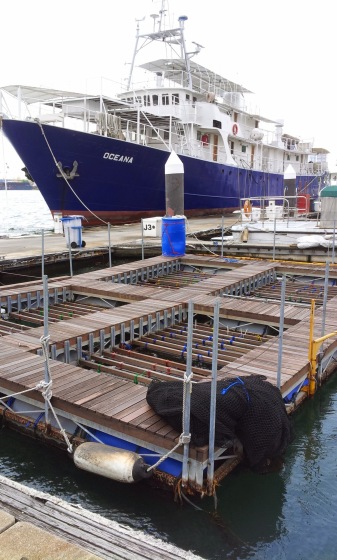

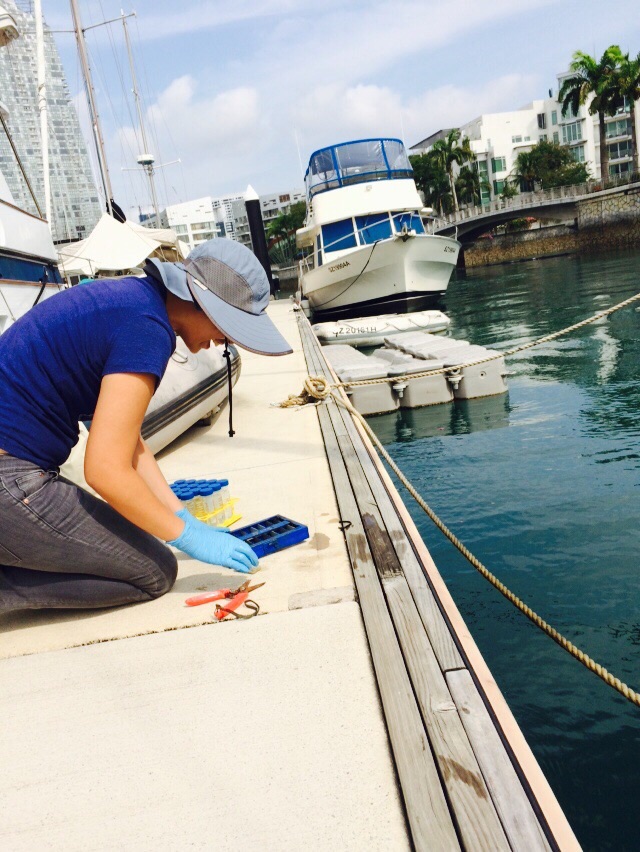
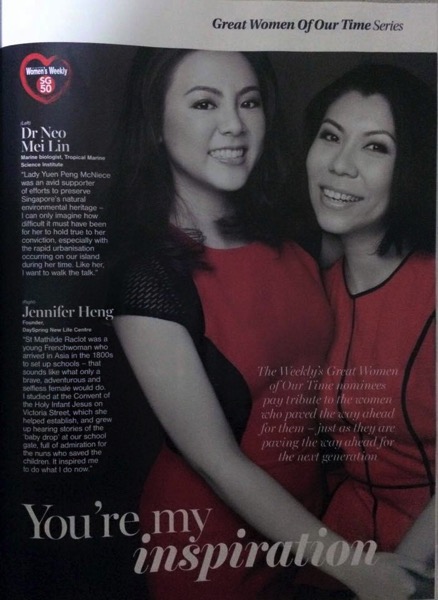
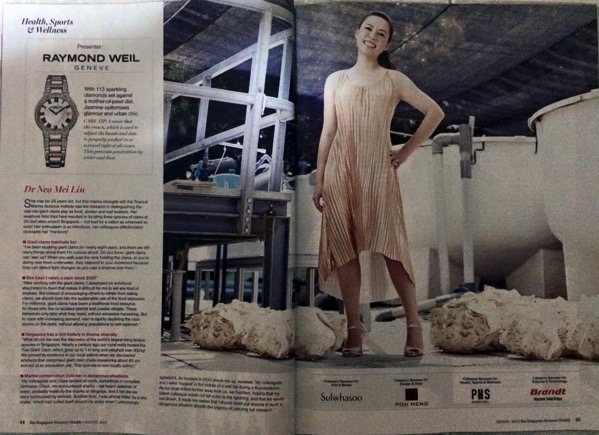

 Prof Chou Loke Ming officially retires today – the end of an era which his Reef Ecology Study Team and many students in the department will continue to reminisce about for decades.
Prof Chou Loke Ming officially retires today – the end of an era which his Reef Ecology Study Team and many students in the department will continue to reminisce about for decades. 


